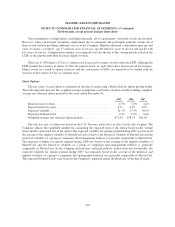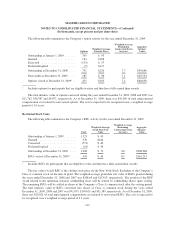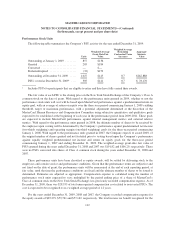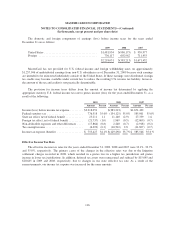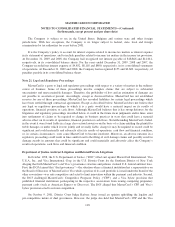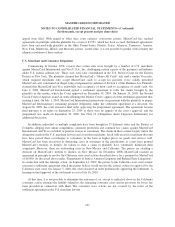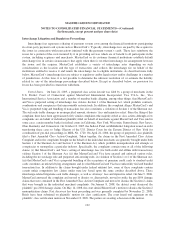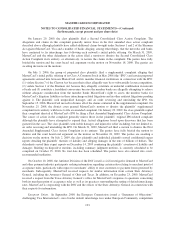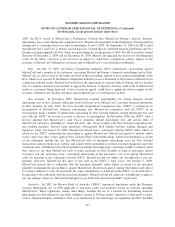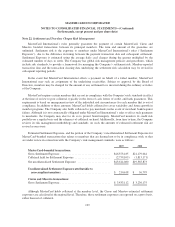MasterCard 2009 Annual Report Download - page 129
Download and view the complete annual report
Please find page 129 of the 2009 MasterCard annual report below. You can navigate through the pages in the report by either clicking on the pages listed below, or by using the keyword search tool below to find specific information within the annual report.MASTERCARD INCORPORATED
NOTES TO CONSOLIDATED FINANCIAL STATEMENTS—(Continued)
(In thousands, except percent and per share data)
bylaw constituted unlawful restraints of trade under the federal antitrust laws. On November 26, 2001, the judge
issued a final judgment that ordered MasterCard to repeal the CPP insofar as it applies to issuers and enjoined
MasterCard from enacting or enforcing any bylaw, rule, policy or practice that prohibits its issuers from issuing
general purpose credit or debit cards in the United States on any other general purpose card network. The Second
Circuit upheld the final judgment and the Supreme Court denied certiorari.
Shortly after the Supreme Court’s denial of certiorari, both American Express and Discover Financial
Services, Inc. filed complaints against MasterCard and Visa in which they alleged that the implementation and
enforcement of MasterCard’s CPP and Visa’s bylaw provision violated both Section 1 of the Sherman Act, which
prohibits contracts, combinations and conspiracies that unreasonably restrain trade and Section 2 of the Sherman
Act, which prohibits monopolization and attempts or conspiracy to monopolize a particular market. These actions
were designated as related cases to the DOJ litigation. On June 24, 2008, MasterCard entered into a settlement
agreement with American Express to resolve all current litigation between American Express and MasterCard.
Under the terms of the settlement agreement, MasterCard is obligated to make twelve quarterly payments of up
to $150,000 per quarter with the first payment having been made in September 2008. See Note 19 (Obligations
under Litigation Settlements) for additional discussion. On October 27, 2008, MasterCard and Visa entered into a
settlement agreement with Discover, ending all litigation between the parties for a total of $2,750,000. The
MasterCard share of the settlement, paid to Discover in November 2008, was $862,500. In addition, in
connection with the Discover Settlement and pursuant to a separate agreement, Morgan Stanley, Discover’s
former parent company, paid MasterCard $35,000 in November 2008.
On April 29, 2005, a complaint was filed in California state court on behalf of a putative class of consumers
under California unfair competition law (Section 17200) and the Cartwright Act (the “Attridge action”). The
claims in this action seek to piggyback on the portion of the DOJ antitrust litigation discussed above with regard
to the district court’s findings concerning MasterCard’s CPP and Visa’s related bylaw. MasterCard and Visa
moved to dismiss the complaint and the court granted the defendants’ motion to dismiss the plaintiffs’ Cartwright
Act claims but denied the defendants’ motion to dismiss the plaintiffs’ Section 17200 unfair competition claims.
MasterCard filed an answer to the complaint on June 19, 2006 and the parties have proceeded with discovery. On
September 14, 2009, MasterCard executed a settlement agreement that is subject to court approval in the
California consumer litigations (see “—U.S. Merchant and Consumer Litigations”). The agreement includes a
release that the parties believe encompasses the claims asserted in the Attridge action. On January 5, 2010, the
court in the California consumer actions executed an order preliminarily approving the settlement, overruling
objections by the plaintiff in the Attridge case. A hearing on final approval of the settlement is set for July 16,
2010. At this time, it is not possible to determine the outcome of, or estimate the liability related to, the Attridge
action and no incremental provision for losses has been provided in connection with it.
Currency Conversion Litigations
MasterCard International, together with Visa U.S.A., Inc. and Visa International Corp., are defendants in a
state court lawsuit in California. The lawsuit alleges that MasterCard and Visa wrongfully imposed an asserted
one percent currency conversion “fee” on every credit card transaction by U.S. MasterCard and Visa cardholders
involving the purchase of goods or services in a foreign country, and that such alleged “fee” is unlawful. This
action, titled Schwartz v. Visa Int’l Corp., et al. (the “Schwartz action”), was brought in the Superior Court of
California in February 2000, purportedly on behalf of the general public. Trial of the Schwartz action
commenced on May 20, 2002 and concluded on November 27, 2002. The Schwartz action claims that the alleged
“fee” grossly exceeds any costs the defendants might incur in connection with currency conversions relating to
credit card purchase transactions made in foreign countries and is not properly disclosed to cardholders.
MasterCard denies these allegations.
119



